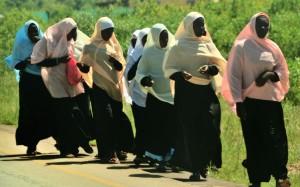
By Joan Koomson, The African Women's Development Fund
African Women Leaders Network for Reproductive Health and Family Planning (AWLN) members in Zanzibar, Tanzania, have succeeded in advocating the Director of the Central Medical Stores (CMS) to issue a directive for all family planning service providers at facilities in two districts—Unguja North and Pemba—to undergo re-training in the management of the Zanzibar Integrated Logistics Systems (ZILS).
A total of 22 staff made up of Central Medical Stores staff, district materials managers, district reproductive and child health coordinators, zonal and district health care service providers and family planning service providers received a five-day training on how to use the ZILS for forecasting of family planning commodity availability at CMS, requirements at the facility level, and disbursement to clients. The training took place October 5-10, 2014.
This directive was issued after AWLN members, working in partnership with the Zanzibar Nurses Association, presented the results of a survey conducted into the reasons for constant stock outs of family planning commodities in these two districts to the director. The results of the survey revealed a lack of capacity on the part of the staff responsible for completing the Returns and Request (R and R) forms which were supposed to show stock levels, commodity usage, and requirements for family planning commodities. This has resulted in a situation where women and girls are not able to access the commodities in their communities, whiles stocks remain in the Central Medical Stores.
AWLN Members Dr. Hanuni Sogora and Dr. Asma Khamis embarked on this advocacy effort to ensure the removal of barriers to accessing family planning and reproductive health services by women and girls in Zanzibar and to encourage uptake of family planning through outreach services.
The training focused on building the capacity of the participants to accurately record family planning stock levels, usage and replenishment as a critical means of determining the acceptor rate of family planning in the target communities. It is expected to result in an improvement in the collection of data on family planning commodities (forecasting, receipts and disbursements/usage) at the facility level and is expected to contribute to a reduction in the shortages. AWLN will be monitoring the situation at the facility level over the next three months to record any changes in family planning commodity management and resultant reduction in barriers to access for women and girls.
Fulfilling the Tanzanian FP2020 Commitment
This advocacy is part of AWLN’s work at the country level to ensure that Tanzania fulfills its commitments towards FP2020. At the London Summit in 2012, the country had committed to:
- Doubling the number of family planning users to 4.2 million by 2015 to reach a national contraceptive prevalence rate of 60%.
- Increasing its financial allocation for family planning, while strengthening partnerships to continue implementing the National Family Planning Costed Implementation Program (NFPCIP).
- Additionally, the government will execute a FP2020 Action Plan (2013-2015) to address regional disparities and inequalities through training, capacity-building, community-based services, and interventions targeting young people and post-partum women, with a particular focus on the Lake and Western Zones.
- Through public-private partnerships and training for service providers and local staff, improve contraceptive commodity security, logistics systems, and method mix. Strategic communications will be used to address barriers to family planning use, through a country-wide campaign carried out at the national and sub-national level.
Zanzibar is one of several islands in the Indian Ocean that form part of Tanzania with a population of 1.3 million with a total fertility rate of 5.1. Maternal mortality is 310 per 100,000 live births. The contraceptive prevalence rate is 12.4%.
AWLN is a network of women leaders from 15 African countries working to strengthen global advocacy efforts for reproductive health and family planning by bringing to the foreground the voices and perspectives of African women. They are a regional partner in the AFP initiative.

